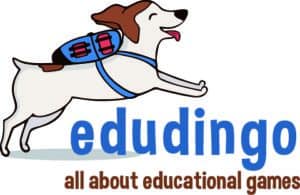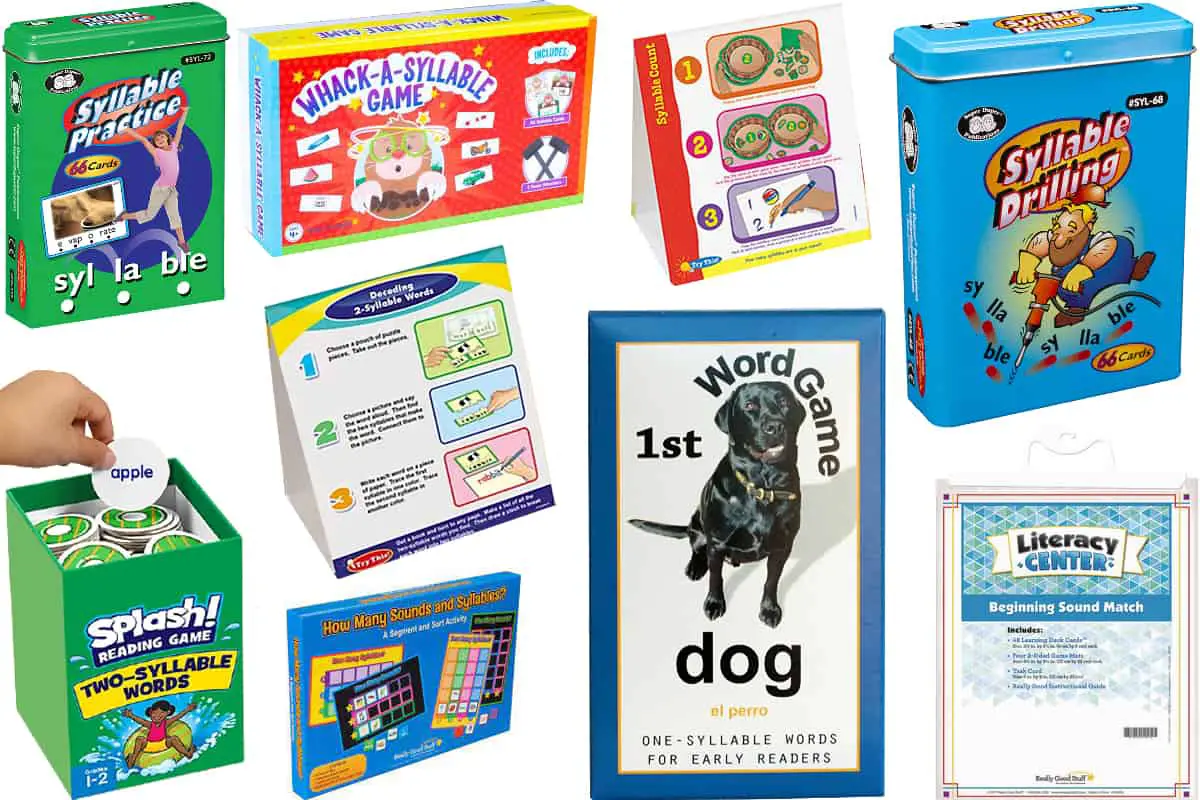This post contains affiliate links.
Understanding syllables is an important phonological awareness skill that makes learning to read easier. So, I’m sharing these syllable card games that you can use in homes or schools.
I found ten syllable card games for preschoolers to second graders or beginning to emergent readers. Most of them are simple matching and sorting games, such as “Syllable Count” and “Graph the Syllable.” And “Whack-A-Syllable” is great because it makes learning more tactile.
Syllable Card Games Comparison Table
| Game | Age | Players | Rating |
|---|---|---|---|
| Syllable Photo Cards | 4‑6 | 1+ | ★★★★☆ |
| Syllable Drilling | 4-6 | 1+ | ★★★★☆ |
| How Many Sounds and Syllables? | 4-6 | 1+ | ★★★★☆ |
| Graph the Syllables | 5‑6 | 1+ | ★★★★☆ |
| Whack-A-Syllable | 4‑6 | 3 | ★★★★☆ |
| Decoding 2-Syllable Words | 5‑7 | 1‑4 | ★★★★★ |
| Splash! | 5‑7 | 2‑4 | ★★★★☆ |
| Syllable Count | 5‑6 | 1‑4 | ★★★☆☆ |
| Syllable Practice | 6‑7 | 1+ | ★★★☆☆ |
| 1st Word Game | 4‑6 | 1‑4 | ★★★☆☆ |
Syllable Card Games
Syllable Photo Cards (Really Good Stuff)
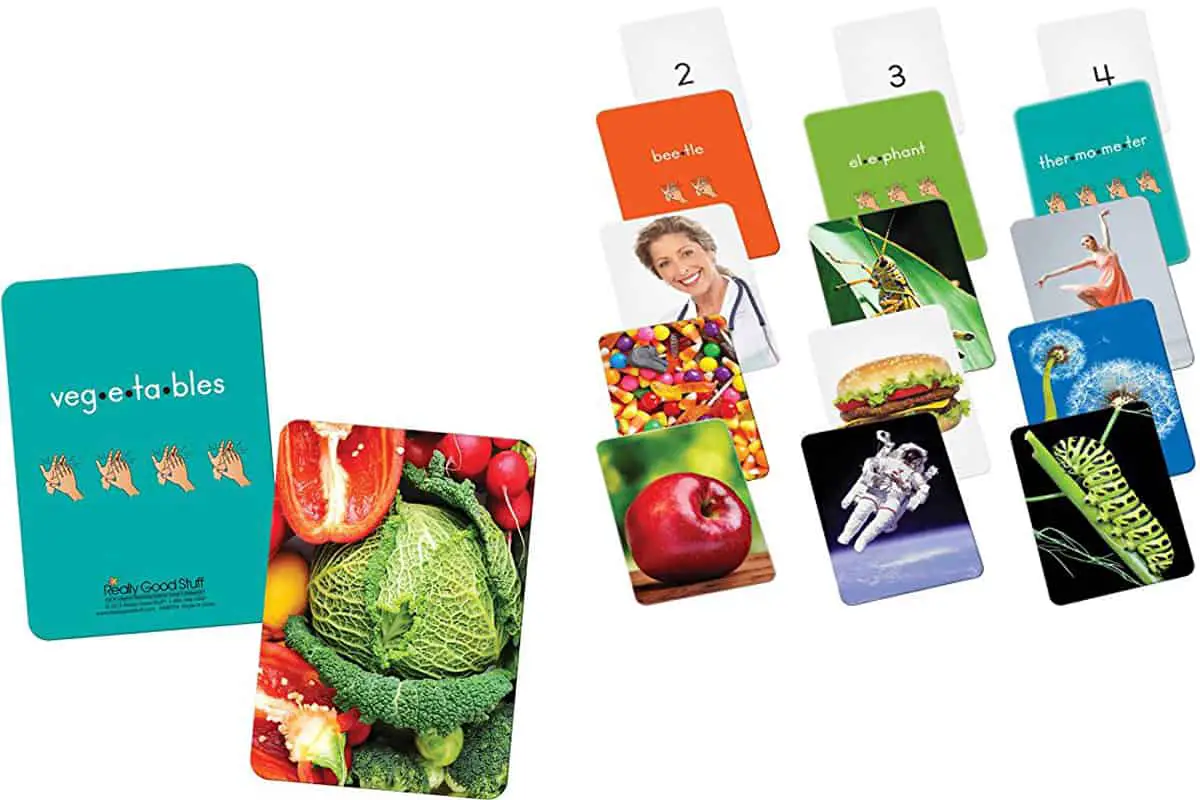
★★★★☆
For Families and Schools | Age 4-6 | 1+ players | Price $$ | Duration 10-20 min
Syllable Photo Cards is a set of 40 cards with a photo on one side and the word broken in syllables on the other side. It uses real-life illustrations of common objectives:
is a set of 40 cards with a photo on one side and the word broken in syllables on the other side. It uses real-life illustrations of common objectives:
- It lists object names broken down in syllables and the number of syllables on the backside for self-correcting
- It can be used to play a matching game (pair cards with the same number of syllables)
- It has a variety of objects with different numbers of syllables from 2-4
As these are only photo cards, you can play various card games with your children. It also lets you make sure that your child relies not only on spelling in identifying the number of syllables. And although there are only 40 cards, you can still use this in the classroom and have your students clap the number of syllables of each object.
Syllable Drilling (Super Duper Publications)
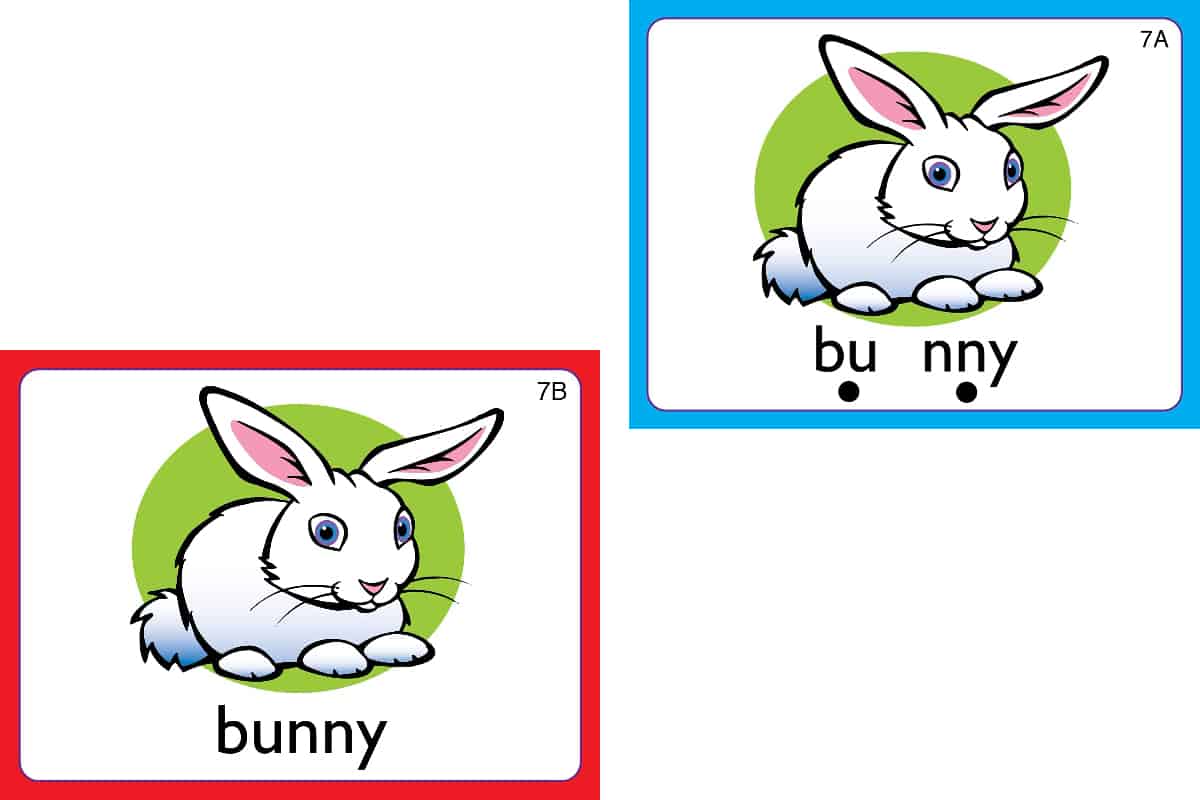
★★★★☆
For Families and Schools | Age 4-6 | 1+ players | Price $$ | Duration 10-20 min
Another excellent deck for teaching syllabication is Syllable Drilling by Super Duper Publications. It has sixty pairs of two-four syllable words with photos and names. One side has the word spelled out as is, while the other is broken down into syllables.
As with the game above, there are no proposed rules. You can use it for matching, sorting, and short answer games. I like that:
- It has over 60 cards which include 12 bonus words
- It includes two-four syllable words
However, I still prefer the Syllable Photo Cards over this set because all the cards here are labeled. Some children might refer to the spelling to figure out the number of syllables.
How Many Sounds and Syllables? (Really Good Stuff)
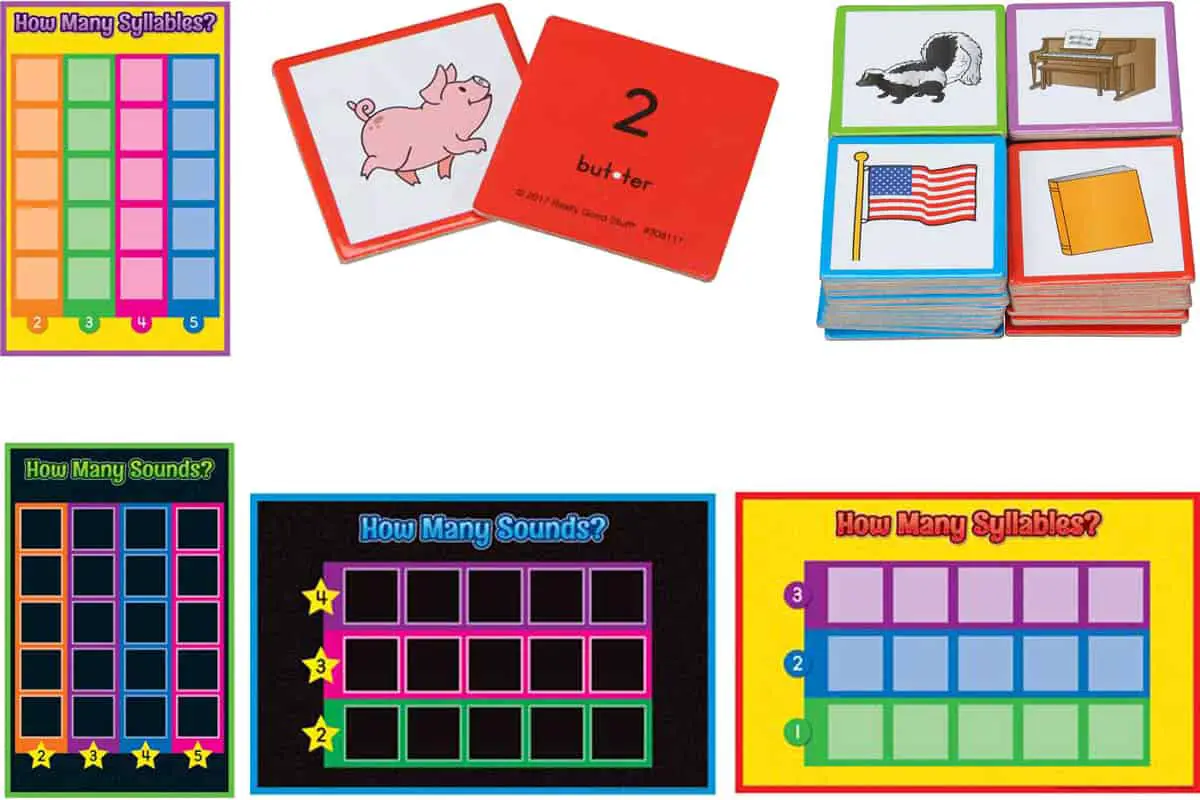
★★★★☆
For Families and Schools | Age 5-6 | 1+ players | Price $$$ | Duration 10-20 min
How Many Sounds and Syllables? is a segmenting and sorting game for beginning readers learning about syllabication. This set comes with four mats and picture tiles.
is a segmenting and sorting game for beginning readers learning about syllabication. This set comes with four mats and picture tiles.
It helps master phoneme identification and segmentation, and syllabication. For teaching syllables or phonemes, children sort the pictures into their proper rows or columns on the mats. The instructions are simple. and it also:
- Has unlabeled photos, so you can really assess the children’s understanding of syllables
- Has everyday objects that your child will be able to name and identify
- Helps widen vocabulary
Graph the Syllables (Really Good Stuff)
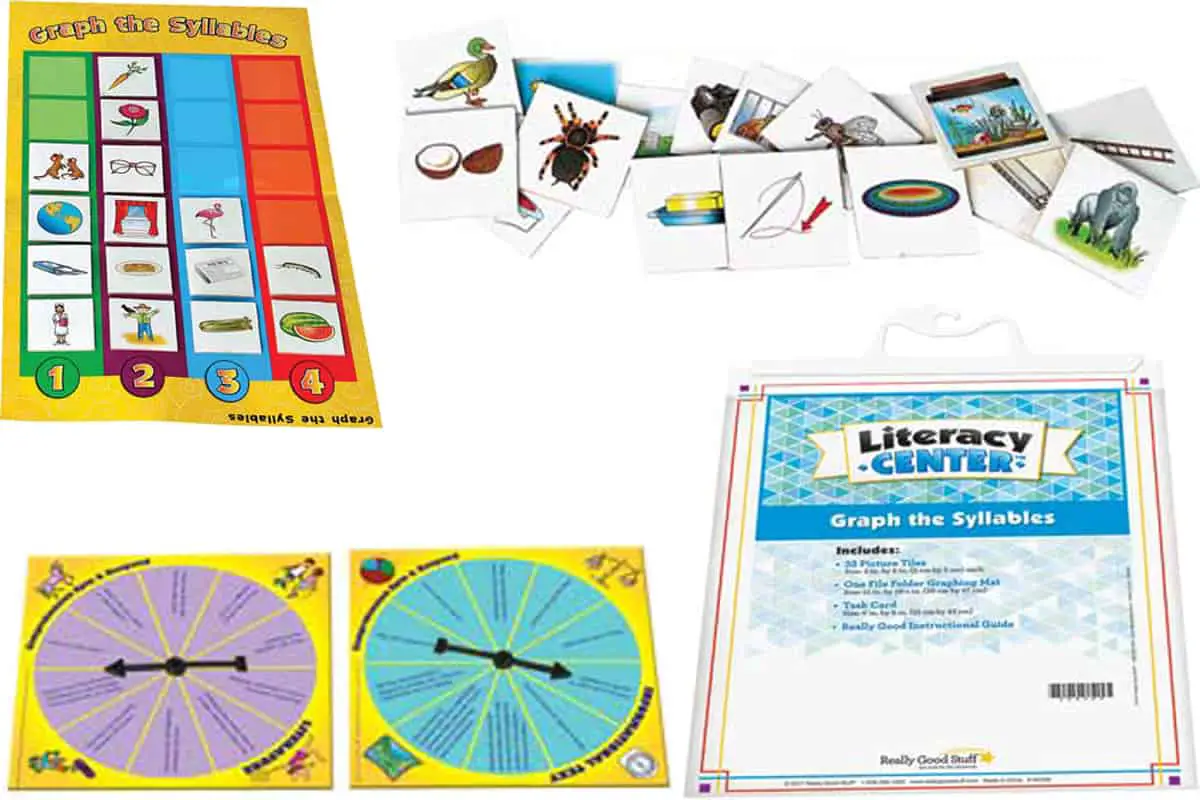
★★★★☆
For Schools | Age 5-6 | 3+ players | Price $$ | Duration 10-20 min
Graph the Syllable is sorting game for literacy centers. It comes with 32 picture tiles and a graphing mat.
is sorting game for literacy centers. It comes with 32 picture tiles and a graphing mat.
Students can play individually, in pairs, or in groups. They listen to the word you call out and put the picture of the objects in their proper column. Unlike the previous games in this post, it also includes monosyllabic words, which are essential in teaching syllables.
The objects in the photos are easy to identify everyday objects.
Whack-A-Syllable (Really Good Stuff)
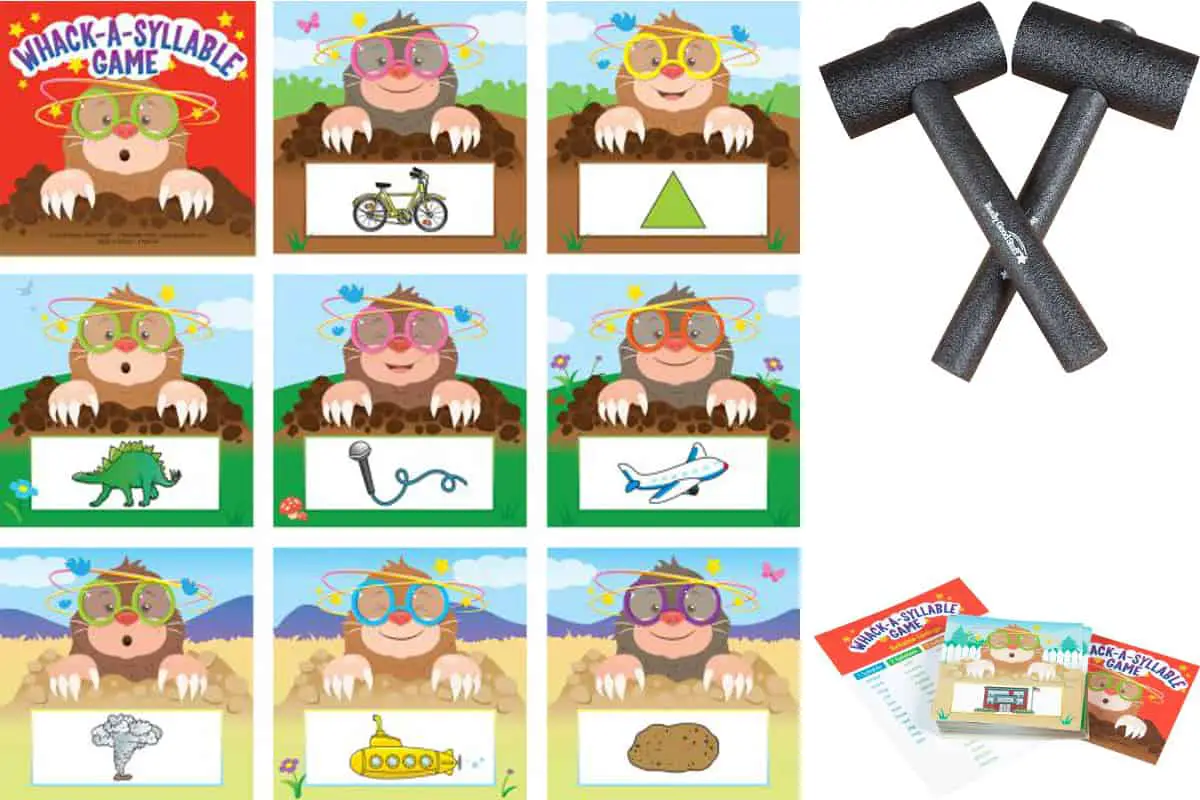
★★★★★
For Families | Age 5-6 | 3+ players | Price $$ | Duration 10-20 min
In Whack-A-Syllable, students as they race to hit a syllable before the opponent does. It is easy to play, and requires three players, with one acting as the caller. To play:
- Lay down all the picture cards on the table
- The caller calls out a number from one to four
- The other players race to find a card that matches the number of syllables. The first to hit a correct card wins it.
- Whoever has the most cards at the end wins.
This game comes with two foam mallets, 50 picture cards, an answer key, and storage. The picture cards are unlabeled, so the caller should be an adult or an older child who already knows their syllables.
I like the tactile aspect (foam mallets are also not noisy, which is great) of Whack-A-Syllable. You may also ask to name the word and hit one to four times, depending on its syllables.
Decoding 2-Syllable Words (Lakeshore Learning)
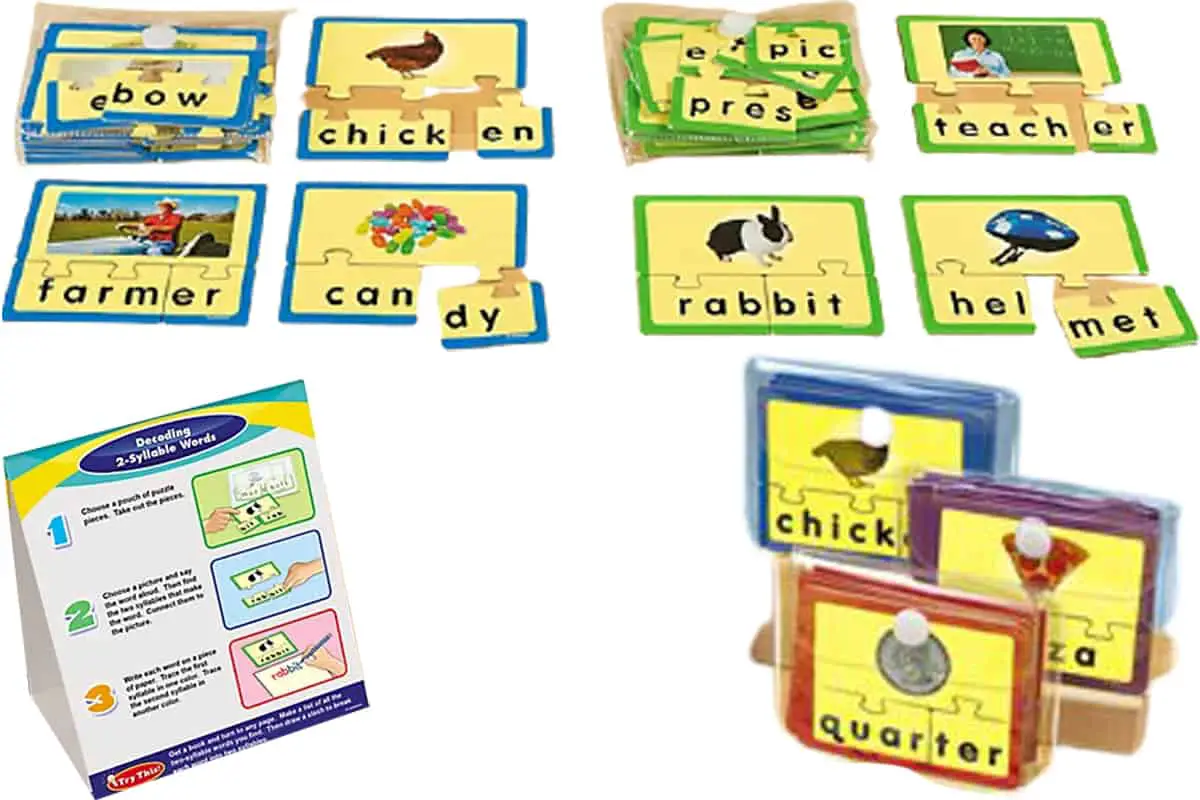
★★★★★
For Families and Schools | Age 5-7 | 1-4 players | Price $$$ | Duration 10-20 min
Decoding 2-Syllable Words is a puzzle card game where children play at their own pace as they learn how to count syllables and read. The cards include pictures of the object and the name broken in syllables.
is a puzzle card game where children play at their own pace as they learn how to count syllables and read. The cards include pictures of the object and the name broken in syllables.
This set comes with four sets of puzzles to accommodate up to four players. The cards have colored edges for easy organization. I recommend it because:
- It is excellent for introducing counting syllables for beginning to emergent readers
- Children learn at their own pace as there is no set time for playing
- It is a puzzle, so it also allows children to self-correct and receive immediate feedback
- It can also be used to practice decoding
The game also comes with easy-to-follow instructions with pictures that you can just leave with the students. So, this game requires little to no adult supervision.
Splash! (Lakeshore Learning)
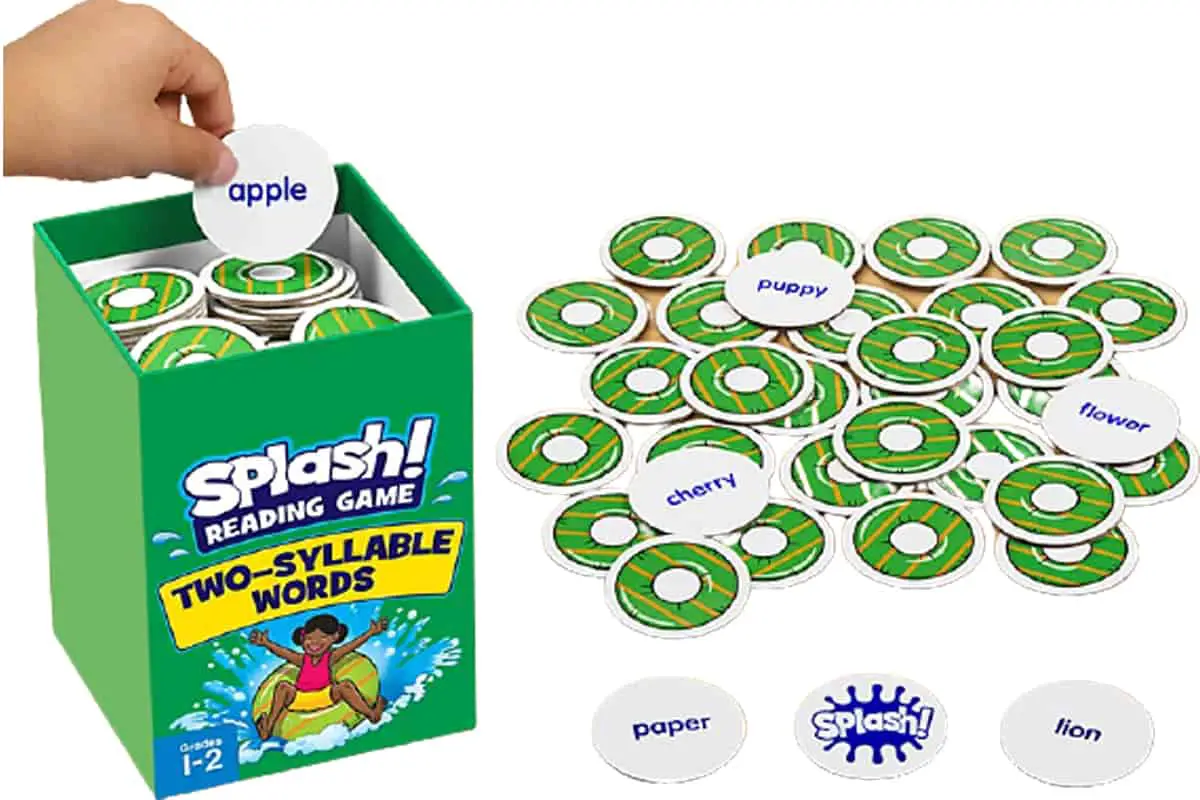
★★★★★
For Families and Schools | Age 5-7 | 2-4 players | Price $$ | Duration 10-20 min
Splash! is a drafting card game. Players draw word cards. They keep them if they read them correctly. If they draw the “splash” card, they lose their cards.
is a drafting card game. Players draw word cards. They keep them if they read them correctly. If they draw the “splash” card, they lose their cards.
This set comes with 108 two-syllable word cards, which is great for replayability. But there are only two-syllable words. The words are also decodable, so it is perfect for more advanced beginning readers to emergent readers.
This game has no pictures, so it is also an excellent tool for assessing your child’s reading skills.
Syllable Count (Lakeshore Learning)
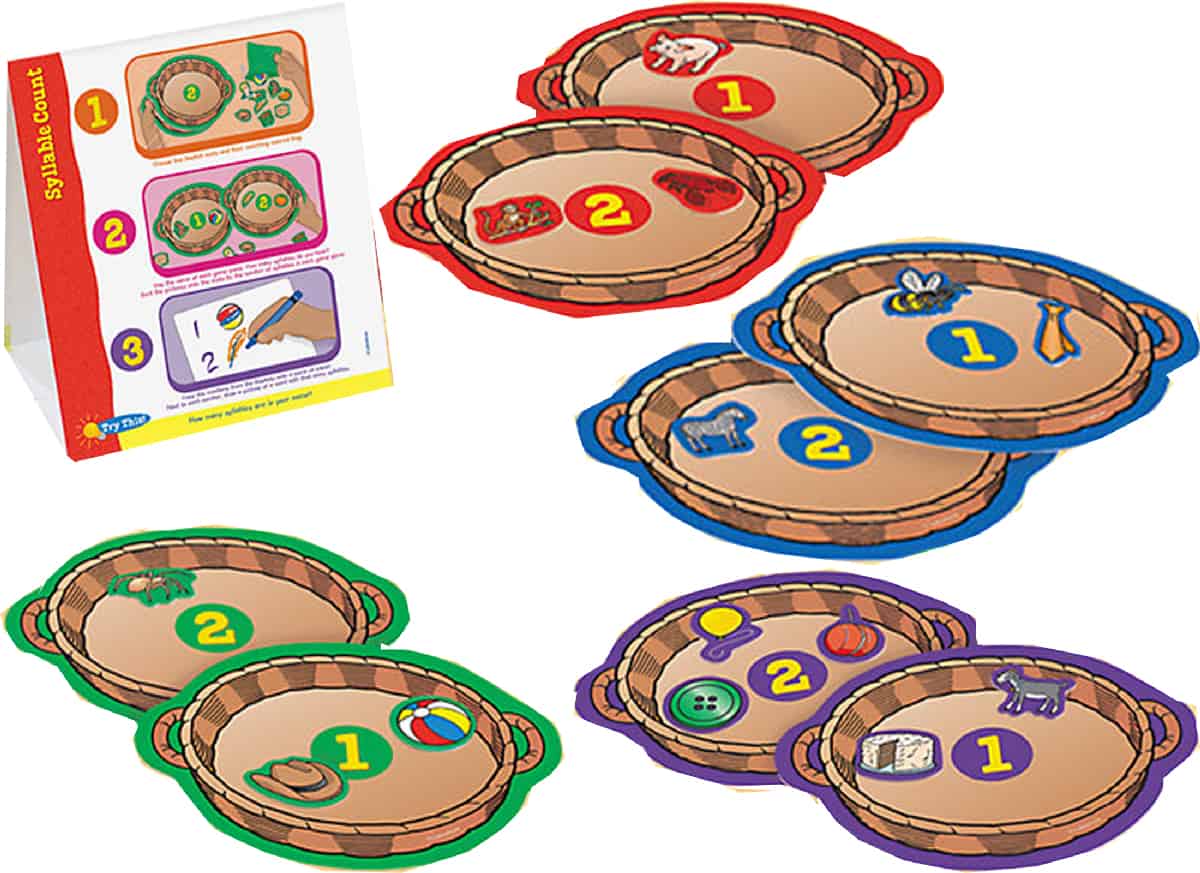
★★★★☆
For Families | Age 5-6 | 1-4 players | Price $30-$40 | Duration 10-20 min
Syllable Count is a sorting card game that includes one to two-syllable words. Each set lets up to four players use this game. It also comes with 40 picture cards and 8 mats for sorting.
is a sorting card game that includes one to two-syllable words. Each set lets up to four players use this game. It also comes with 40 picture cards and 8 mats for sorting.
Syllable count can be used for independent play because it uses everyday objects that young children can easily name and identify. Other good points are that:
- It is easy to play
- It comes with unlabeled picture cards, so it minimizes guessing
- It lets children play with minimal supervision
- Cards are color-coded for easy organization
However, some adult supervision may be necessary to check their understanding of syllables. And there are only 40 pictures cards, meaning four players only get to practice with ten words at a time.
Syllable Practice (Super Duper Publications)
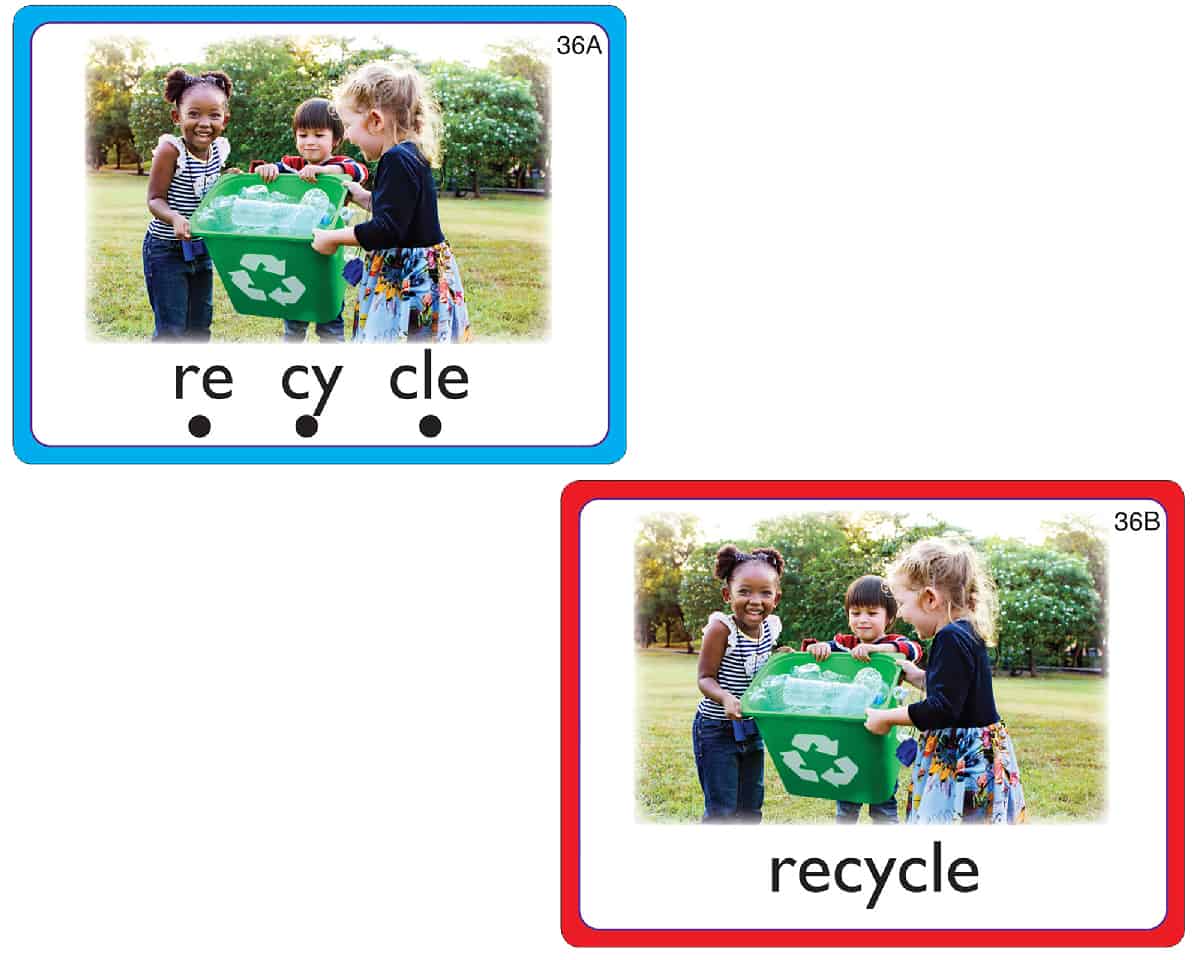
★★★☆☆
For Families and Schools | Age 5-6 | 1+ players | Price $$ | Duration 10-20 min
Syllable Practice is a deck of 60 two to four-syllable words composed of more advanced words for emergent to early fluent readers. The cards come with pictures and syllabicated and non-syllabicated words.
is a deck of 60 two to four-syllable words composed of more advanced words for emergent to early fluent readers. The cards come with pictures and syllabicated and non-syllabicated words.
I like Syllable Practice because you can use it as matching, sorting, or short answer game. It also includes longer, more uncommon words, which helps widen children’s vocabulary. There are also 12 additional words that you can use to teach how to syllabicate.
However, words may be decodable, but some words are too difficult to understand at this age. It includes words like conservation and biography. Adult supervision is necessary, so someone can explain to them what the words or pictures mean.
1st Word Game (Flash of Brilliance)
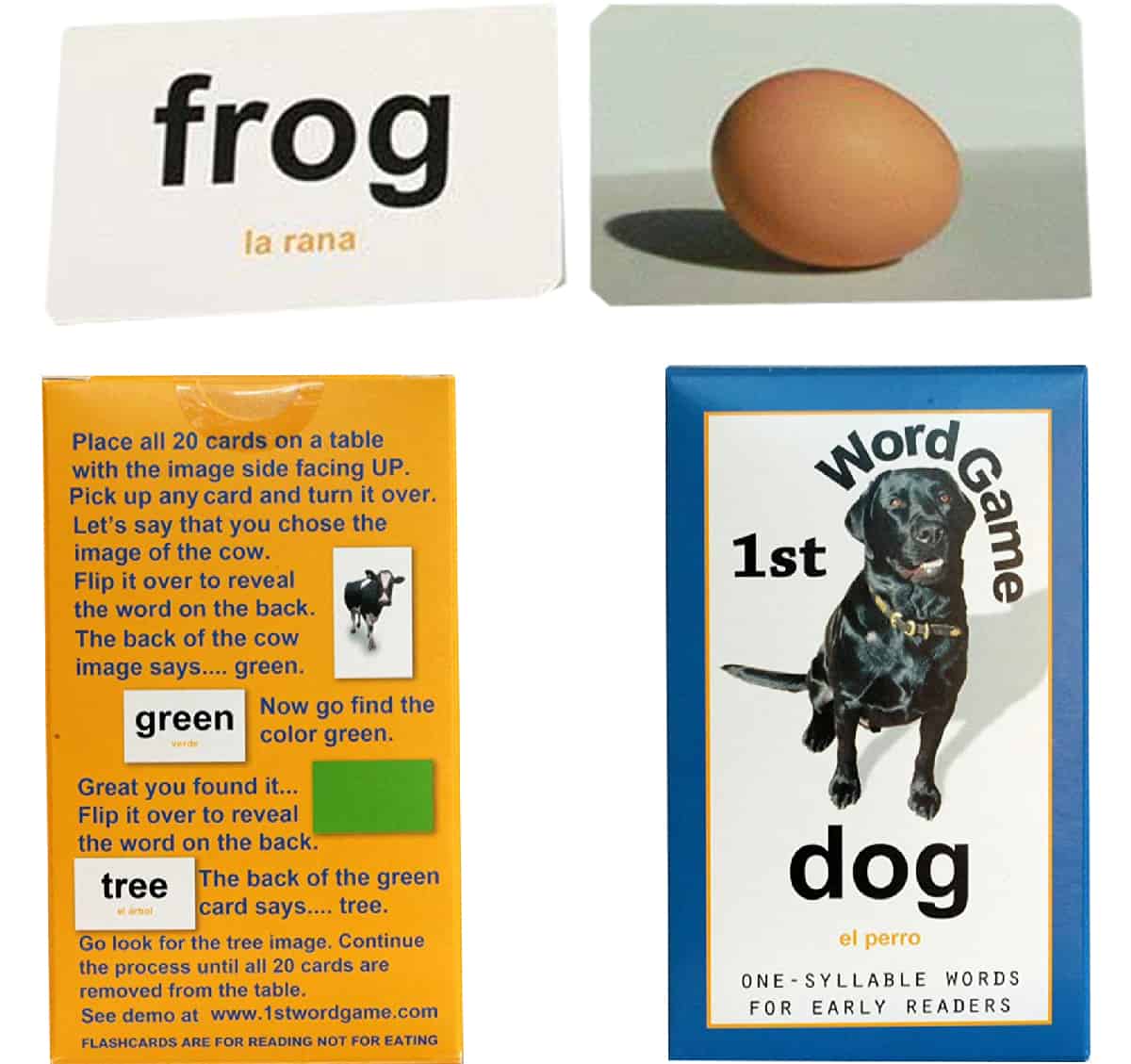
★★★☆☆
For Families | Age 5-6 | 1-4 players | Price $$ | Duration 10-20 min
Understanding monosyllabic words are also necessary for developing syllabication skills. The 1st Word Game is an excellent card game to teach that pattern.
is an excellent card game to teach that pattern.
1st Word Game comes with only 20 cards but is easy and fun to play:
- Player lay the cards on the table with the picture side up.
- A player chooses a card, names it, and reads the word on the other side.
- Players pick the picture that matches the word they just read.
- They take turns naming, reading, and flipping cards until all cards have been turned
This set is a cooperative, matching card game that develops communication, reading, and phonological awareness skills. However, there are only twenty cards, so replayability is low.
Other Phonological Awareness Board and Card Games for Preschoolers to Second Graders
Learning about syllables helps children become better readers. It allows them to divide longer and more complicated words into chunks, making reading them more accessible. It also improves reading fluency because it lessens instances of syllable deletion during reading.
If you’re interested in more games that teach phonological awareness skills, then check out these posts:
- 10 Rhyme Board Games and Toys for Preschoolers and Primary School

- 8 Rhyme Bingo Games for Schools and Families

- 13 Rhyme Card, Puzzle & Domino Games for Primary & Preschool Children

Edudingo.com is a participant in the Amazon Services LLC Associates Program, an affiliate advertising program designed to provide a means for sites to earn advertising fees by advertising and linking to Amazon.com. We also participate in other affiliate programs which compensate us for referring traffic.
